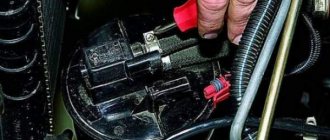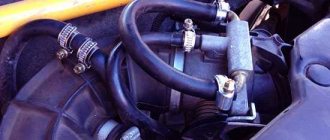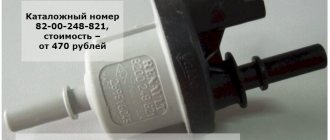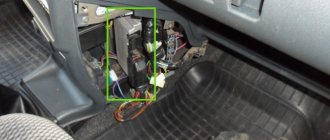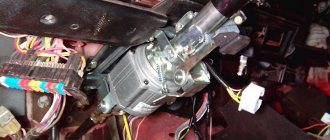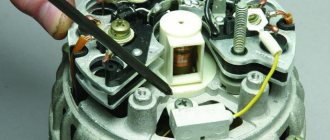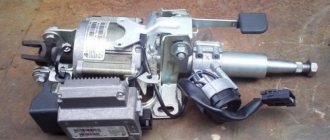The adsorber began to be installed on the Lada Granta for the first time since its release in 2011.
Adsorber
The equipment is designed to absorb and redirect the flow of gasoline vapor back into the fuel tank. This prevents fuel from entering the intake manifold.
During operation, the product wears out and often fails. Increased fuel consumption is the first sign of a malfunctioning adsorber.
Let's consider the algorithm for replacing the canister purge valve on the Lada Grant on our own.
Where is the canister purge valve located on different modifications of the Lada Granta?
Regardless of the modification of the power unit (8 and 16 valve), the sensor is installed in the upper left part of the engine compartment. Closer to the drive belt.
In the 16-valve engine version, the top of the engine is covered with a decorative plastic cover. Before starting work, carefully remove the decorative element and begin the repair.
Malfunctions in the fuel vapor recovery system Lada Kalina
Since the solenoid valve itself is not a complex device, it has few malfunctions as such - it may not open or close when necessary, or may freeze in a certain position. But the culprit of the breakdown may not only be Evap-Solenoid; the gasoline vapor recovery system does not work correctly for other reasons:
- connecting pipes are pinched or clogged;
- normal vacuum is not created in the system;
- due to an open circuit, there is no voltage on the valve;
- the carbon filter is completely clogged (which is rare);
- The control unit malfunctions.
Sequence of actions when replacing the adsorber purge valve with your own hands
- We place the car within the perimeter of the repair area, install wheel chocks, and activate the parking brake.
- We open the hood, the engine cools down to a safe temperature so as not to damage the skin.
- An adsorber valve is installed in the upper left part of the engine compartment. Carefully pry up the block with wires with a screwdriver and remove the contacts.
Link on topic:
Replacing the timing belt Lada Granta 8/16 valves. Why does the belt break?
Removing contacts
- Unscrew the screw and remove the sensor from its original place
- We troubleshoot the unit, check the integrity of the circuit, the absence of deformation or damage.
- We install a new valve and assemble the structure in the reverse order.
Replacement of the Lada Granta adsorber sensor is completed.
Replacing the adsorber sensorAdditional features
Of course, the Lada Granta adsorber, originally created to create environmentally friendly engine operation, the price of which is low, was underestimated. Manufacturers tried all sorts of tricks to get around this new trend, but the law forced all car manufacturers who did not comply with this innovation to pay huge fines.
Although AvtoVAZ has never stood out for its large exports, it was nevertheless forced to take measures to install an adsorber, since it has a small, but still small, sales market. Today, an adsorber is required to be installed on Lada Granta, as world research has revealed the following capabilities of this component:
— reduction in gasoline consumption
A similar result is achieved because the adsorption valve allows gases to be discharged into the gas tank, from where they enter the engine, which, when heated, can process them. If this device is not available or the canister valve itself fails, Granta loses fuel, which significantly increases fuel consumption.
— normalization of the exhaust system
Thanks to filtration, the likelihood of premature wear of the system and its components disappears.
Valve malfunctions, solutions
| Signs | Diagnosis/fix |
| Systematic smell of fuel in the car interior | The circulation of gases is disrupted, there is a leak. Due to the proximity to the air filter, gases enter the car interior. |
| Valve knock | To check the serviceability of the valve, it is enough to sharply accelerate; if the knocking does not disappear, the purge valve is faulty. Replace with a new one. |
| Increased fuel consumption | A faulty gas ventilation valve cannot fully control the flow. Install a new valve. |
| The flow of exhaust gases in the exhaust system has increased | The solenoid valve for purge the adsorber does not work properly. |
| Engine operation is accompanied by hissing | The first sign of excessive gas accumulation. Maintenance of the unit, replacement of worn elements. |
| Uncharacteristic sounds coming from the gas tank | At the same time, the valve can operate normally without giving any “signs”. Maintenance of the unit, dismantling the vapor trap. |
| Error - P0441 | Diagnostics of the on-board computer, deletion, elimination of data in the firmware. |
Checking the functionality of the adsorber
To make sure that the malfunction is related specifically to the valve of this element, you can send the car for a full diagnosis. But this is expensive, so let’s first try to identify possible problems ourselves.
First of all, you need to see if the controller is generating errors, for example, “open circuit control.” If everything is fine, then it will use a manual check. To do this, just prepare a multimeter, a screwdriver and several wires. After this you need to follow a few simple steps:
- Raise the hood of the car and find the valve you need.
- Disconnect the wiring harness from this element. To do this, you must first release the special lock that secures the pad.
- Check if there is voltage going to the valve. To do this, you need to turn on the multimeter and switch it to voltmeter mode. After this, the black probe of the device is connected to the ground of the car, and the red probe is connected to the connector marked “A”, which is located on the wiring harness. The next step is to start the engine and see what readings the device gives. The voltage should be the same as the battery. If it is not there at all or is too small, then you will probably have to look for a more serious problem. If everything is fine with the voltage, then you can move on to the next step.
- Remove the purge valve. To remove it you need to use a screwdriver to slightly loosen the clamps. After this, you can easily move the valve slightly up and smoothly pull it out along a small bracket. After this, the device must be connected directly to the battery terminals. One wire goes to the purge valve (to “+”), and the second is connected to “minus”. After this, both conductors are connected to the corresponding battery terminals. If there is no click, then the valve is completely out of order and it is best to replace it.
Intervals for prevention and replacement. Consequences of ignoring a fault
Failure to respond to a malfunction in a timely manner contributes to premature wear of the fuel pump. Gasoline vapors accumulate in the intake manifold, the engine loses power, and fuel consumption rapidly increases. This ultimately leads to a complete engine stop.
The instruction manual does not contain an exact replacement interval. A prerequisite is preventative maintenance at every scheduled maintenance. The technicians install a new valve as soon as the standard one fails.
In practice, the average service life is 75 – 85 thousand km.
Error P0441
Owners of Lada Kalina often note that during the operation of the car, error P0441 appears, indicating that the gasoline vapor purge system is not operating correctly (the air flow differs from the norm). The cause of this malfunction may be:
- inoperative adsorber valve;
- clogging of the air line from the control unit to the air filter;
- air leakage through connecting pipes.
What should not be immediately considered is the line from the gas tank to the adsorber; here, a breakdown does not in any way affect the readings of the computer or diagnostic scanner. Still, most often Evap-Solenoid fails; this is a characteristic “disease” on Kalina.
If the EVAP valve stops functioning normally, it is not at all necessary that the engine will lose power, the fuel pump will fail, and so on. Mainly due to problems with the control gear, exhaust toxicity increases, and the Check Engine on the dashboard periodically lights up. There are car owners who do not pay attention to the diagnostic warning light, continuing to operate the car, but do not experience any great inconvenience. And most often in such a case, gasoline consumption does not exceed the norm, the engine starts normally, and no serious problems occur in the fuel system.
1200 rub. for the photo report
We pay for photo reports on car repairs. Earnings from 10,000 rubles/month.
Write:
Many car owners may be interested in the question of how to check the adsorber and its purge valve when the diagnostics showed it to be faulty (an absorber error popped up). It is quite possible to make such a diagnosis in a garage, however, for this it will be necessary to dismantle either the entire adsorber or just its valve. And to carry out such a test, you will need metalworking tools, a multifunctional multimeter (to measure the insulation value and the “continuity” of the wires), a pump, and a 12 V power source (or a similar battery).
Replacement of components of the fuel vapor recovery system on a Lada Granta (VAZ 2190) car
At the beginning of the article, we looked at the process of replacing the adsorber purge valve. However, this is only an integral part of the entire system, which includes:
- adsorber;
- vapor separator;
- gravity valve.
Related link:
Features of replacing the cooling radiator on a Lada Grant with your own hands
Each of the above elements is dismantled from its regular place for the purpose of prevention and replacement.
Note to the driver! Before starting work, disconnect the terminals from the battery to avoid a short circuit in the circuit.
How to repair the adsorber and valve
It’s worth noting right away that in most cases both the adsorber and the valve cannot be repaired; accordingly, they need to be replaced with similar new units. However, as for the adsorber, in some cases, over time, the foam in its body rots, which is why the carbon contained in it clogs the pipelines and the solenoid valve of the EVAP system. Rotting of foam rubber occurs for banal reasons - from old age, constant temperature changes, exposure to moisture. You can try to replace the foam separator of the adsorber. However, this cannot be done with all units; some of them are non-separable.
Dismantling the adsorber Lada Granta VAZ 2190
Due to the design features of the Lada Grant, access to the adsorber is difficult. First we perform the following steps:
- We remove the fuel tank from the bottom of the car, unscrew the six bolts around the perimeter, and disconnect the block with wires from the fuel pump.
- Disconnect the canister vent pipe and press the lock.
Disconnect the pipe
- We remove the adsorber, remove it from the retainer, replace it with a new one, and assemble the parts in the reverse order.
Removing the adsorber
How to check the adsorber
Now let’s move directly to the algorithm for checking the adsorber (its other name is the fuel vapor accumulator). The main task in this case is to determine how sealed its body is and whether it allows fuel vapors to escape into the atmosphere. So, the check must be performed according to the following algorithm:
- Disconnect the negative terminal from the vehicle battery.
- First, disconnect all hoses and contacts going to it from the adsorber, and then remove the fuel vapor accumulator directly. This procedure will look different for different machines, depending on the location of the assembly, as well as the mounting means with which it was secured.
- It is necessary to plug (seal) the two fittings tightly. The first one goes directly to atmospheric air, the second one goes to the solenoid purge valve.
- After this, use a compressor or pump to apply a slight air pressure to the fitting going to the fuel tank. Don't overdo it with pressure! A working adsorber should not leak from the housing, that is, be sealed. If such leaks are detected, then most likely the unit needs to be replaced, since it is not always possible to repair it. In particular, this is especially true if the adsorber is made of plastic.
It is also necessary to perform a visual inspection of the adsorber. This is especially true for its body, in particular, for rust spots on it. If they occur, then it is advisable to dismantle the adsorber, get rid of the mentioned spots and paint the body. It is imperative to check whether coal from the fuel evaporation accumulator is leaking into the EVAP system pipelines. This can be done by inspecting the condition of the adsorber valve. If it contains the mentioned carbon, then you need to change the foam separator in the adsorber. However, as practice shows, it is still better to replace the adsorber completely than to engage in amateur repairs that do not lead to success in the long term.
Addresses of companies providing installation/replacement services (Moscow, St. Petersburg, Kyiv region)
| № | Name | Address |
| 1. | "Diesel Master" | Russia, St. Petersburg, Moskovskoe highway, 13A, Zvezdnaya metro station |
| 2. | "Author+" | Russia, St. Petersburg, Mineralnaya str., 13O, Vyborgskaya metro station |
| 3. | "Service Team" | Car service, automatic transmission repair, tire side cut repair, car air conditioner repair, Strogino metro station, Marshala Proshlyakova street, 12k1s1 |
| 4. | "Berlin Motors" | Car services, repair of electronic vehicle control systems, repair of electrical equipment, repair of fuel equipment for diesel engines, metro station Gagarina Square, Vavilova, 13a, 1st floor |
| 5. | "Kulibins" | Kyiv, st. Borova 2/38 |
| 6. | "Renault-Life" | Kyiv, st. Novokonstantinovskaya, 1 G |
Related link:
Tips from experts on replacing Lada Granta glass with your own hands
List of online stores providing goods (Moscow, St. Petersburg, Kyiv region)
| № | Name | Address |
| 1. | "Dion Auto" | https://dionauto.com.ua/ |
| 2. | "PROM.ua" | https://kiev.prom.ua/ |
| 3. | "Skladexpress" | https://skladexpress.ru/ |
| 4. | "Remkuzov" | https://www.remkuzov.ru/ |
| 5. | "Avito" | https://www.avito.ru |
| 6. | "Drom" | https://baza.drom.ru/ |
Review of prices from different manufacturers
| Manufacturer article number | Price, rub.) | Resource (Thousand km) |
| VAZ 2190-1164200 | From 400 | 75 – 95 |
| 2190-1164200-01 | —/— | —/— |
| UTES, ULYANOVSK 11181164200 | —/— | |
| Canister purge valve with tube for 16-valve. LADA Kalina / Granta 11184-1164042 | From 600 | —/— |
| 11184-1165678 | —/— | —/— |
| 11184-1166541 | —/— | —/— |
*prices are current as of November 2, 2018.
Purpose
This part was not always an integral part of the car. We owe our appearance to modern requirements for environmental friendliness of cars, or rather to the Lada Granta adsorber, acquired thanks to Euro-3.
(Euro-3 is an environmental standard introduced in 1999, but Russian manufacturers were able to meet its requirements only in 2008)
The adsorber, for which Granta became one of the first “shelters” on the domestic automotive market, is a spare part directly connected to the catalyst. Allows you to store gasoline vapors, preventing them from entering the exhaust manifold.
These actions help preserve the catalyst and prevent its premature wear, since the combination of a cold catalyst with gasoline vapor is unacceptable. As soon as the engine warms up to the required temperature, the adsorber purge sensor is activated. The cylinder valve returns vapor to the gas tank.
Reviews
| № | Positive |
| 1. | Vladilen: I have no problems with the gas exhaust system, the mechanism works properly. I regularly carry out technical inspections and fill up with high-octane fuel. |
| 2. | Vitaly: at 30,000 km the purge valve began to knock. I took the car to the service center, they replaced it with a new one, since then there have been no comments on the work, the mechanisms are working properly. |
| 3. | Kirill: I’ve been actively driving Grant for the second year, it works like a watch, there are no complaints. I believe that compliance with maintenance schedules, high-quality oil, high-octane fuel is the key to long-term operation |
| 4. | Ivan: I’ve been actively using the car for a year and a half, there are no complaints about the quality of workmanship or assembly. Breakdowns happen, but they are minor. I fix it myself, I don’t go to a workshop. |
| 5. | Vladlen: two years have passed since I bought the car, I haven’t made any investments. My recommendations to motorists: buy domestic. |
| 6. | Dmitry: in a year and a half of using the car, I went to the service station twice unscheduled, no breakdown was found, but there was a whistle in the exhaust system. |
| 7. | Georgy: I’m happy with the purchase of the car, the car works like a watch, there are no complaints. I strictly comply with the manufacturer’s requirements, visit official services, and fill up with high-quality fuel. |
| Negative | |
| 1. | Ignat: the first valve flew 30,000 km, the second after 20,000 km. The workmanship is low, the model is crude, there are many shortcomings and shortcomings. I expected better from the Lada Grant. |
| 2. | Dmitry: I drove it for a year and a half without problems, after which the car began to fall apart, I visit service stations more often, carry out repairs and preventive maintenance. |
| 3. | Victor: I do not recommend the domestic brand due to the poor quality of the machine and many defects. |
Related link:
Idle speed sensor on Lada Grante: where is it located and how to replace it
Price policy
Speaking about the Grant adsorber purge valve, which can be purchased today in all large and not so large places for selling spare parts for the Russian auto industry, it is impossible not to note its pleasant price. The Grant adsorber valve, the price of which is equivalent to the probability of its failure, allows for independent replacement and is a simple mechanism.
Thus, maintaining the environmental standards of the Lada Granta is truly a man-made matter. The adsorber has become a part that, in addition to caring for the environment, can significantly reduce fuel consumption and improve the operation of exhaust gas removal.
So, I promised to describe in detail the problem I once had with the CPA. Writing.
Oh, that canister purge valve! The only breakdown that somewhat overshadowed the generally cloudless ownership of the Grant... There was a whole epic with it. And it was like this.
Exactly closer to 50,000 miles, the car began to periodically glitch and drive poorly, as if it had lost 30% of its power. The revolutions dropped sharply when coasting (as soon as you released the gas, the tachometer needle fell down) and even during acceleration the revolutions could sag slightly and float. Acceleration was very slow. For example, in order to accelerate 10-20 km in 4th gear, the automatic transmission was forced to switch to 3rd gear and turn the engine at 4000+ rpm. There was simply no way to improve otherwise. At the same time, the car howled and hummed loudly (there was a characteristic sound of air flow - like in a vacuum cleaner hose) and did not drive properly. And when driving, it felt as if you were driving not a small, light Grant, but a heavy truck. I also had a strong feeling that when I pressed the gas, someone was holding the brake a little. Well, it can’t be the same? It was terribly annoying! And most importantly, at first the glitch was floating. During one trip the car could malfunction all the way, it could be released unexpectedly at any moment, or it could not be released until the next trip. The car could drive normally for several days or malfunction for several days.
They looked for the reason for a long time, about 3 months. There were no receipts. The OD looked at my husband and me with sad eyes. They listened, shook their heads, and in the end they said, “Well, it’s going wrong, it’s not clear, if it breaks down completely and stops going, then come back,” and they sent me home. Commercial services also couldn’t say anything, or even suggest WHAT it could be. So we started looking for ourselves. First, we went through the brake system to eliminate the influence of jamming of the handbrake and brakes. Replaced the handbrake cable. The rear brake pads, as it turned out, were already time to be changed, so they were replaced. The front was normal, they just checked it and left it as is. Then we did everything ourselves, because... they sent us to the services with our trouble.
A friend suggested changing the air filter, so they did. Nothing was named. They began to dig deeper.
By that time, it was already clear that the problem was related to excess air entering the intake manifold, i.e. the mixture became lean. By the way, my gas mileage was surprisingly low back then. On the highway about 6 liters of 95, in mixed mode - no more than 6.5 liters. Next, we began to turn off the oxygen flow sensors sequentially and tried driving without them. Nothing changed, the car continued to malfunction, i.e. it wasn't about them. Replaced the air flow sensor with a new one. Nothing has changed either.
And finally we got to the KPA. My husband bought a new KPA “Utes” from Kalina because there was no other one in the store, but the sellers claimed that it would also be suitable for Grant. We adjusted it and went to test it. And again Nothing happened, the car was absolutely glitchy. So what is it? And then a miracle happened - after a few minutes of driving with the Utes, the CHECK light came on for the first time! The check told us about the incorrect air flow through the control unit. Those. Too much or too little air is passing through the valve. As a result of subsequent experiments, it turned out that the Kalinovsky CPA on Grant does not have enough voltage to operate and does not open at all. Then we took radical measures to check whether the problem was still with the CPA. We turned off the KPA completely and drove off without it. And OH MIRACLE, the car picked up and drove again as before! The difference in the ride before and after was obvious and felt very clearly, even from the passenger seat.
Conclusion
The standard canister bleed valve on the Lada Grant works properly. Cases of breakdowns and premature wear are rare. Mainly related to violation of technical inspection deadlines and vehicle operating conditions.
Often, in order to save money, owners purchase cheap analogs of spare parts. It is obvious that the quality of the components does not correspond to the original spare parts.
When choosing parts, give preference to factory spare parts with original catalog numbers.
What does the absorber sensor affect?
Publication date: September 13, 2022.
Category: Automotive equipment. An adsorber (often called an absorber) is one of the components of a car that is responsible for absorbing and neutralizing gasoline vapors coming out of the tank. Many car owners believe that this is a completely unnecessary device that only creates unnecessary problems, so they often remove it altogether.
However, increased gasoline consumption and other problems in the operation of the system, as a rule, arise only if the absorber valve fails. Therefore, before you mercilessly remove this unit, it will be useful to learn a little more about the features of its operation and the procedure for changing the device.

